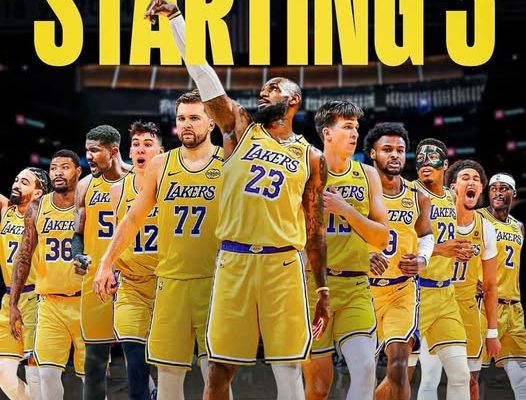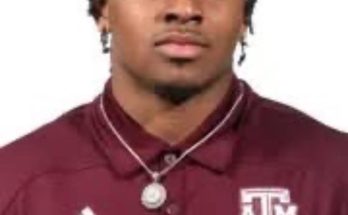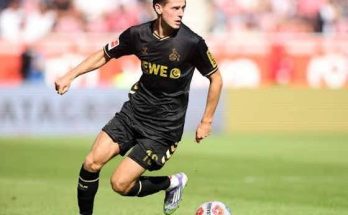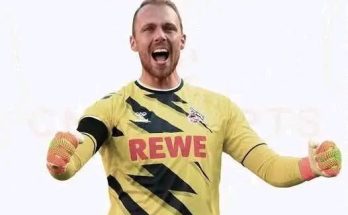The Los Angeles Lakers are entering this upcoming season with one of the most intriguing and multifaceted rosters in the NBA. After a summer of calculated moves, major trades, and internal growth, the Lakers have positioned themselves as not just contenders but legitimate championship threats. This isn’t merely about assembling big names anymore—this is about fit, chemistry, and making every possession count on both ends of the floor. The franchise, which always operates under the most intense spotlight in professional basketball, now finds itself in a rare position: deep, balanced, and capable of adapting to almost any matchup. But with great depth comes difficult decisions, and the biggest question looming over head coach Darvin Ham and his staff is simple—who starts, and who closes?
LeBron James, entering what seems like his 100th season, continues to defy the laws of time and biology. His leadership, IQ, and all-around brilliance make him an automatic fixture in any lineup. As long as he’s healthy, he’ll be on the court when the game is on the line. And for as much as LeBron is still the gravitational force of the Lakers, the supporting cast around him now has layers we haven’t seen in quite some time. Austin Reaves, for instance, has evolved from an undrafted underdog into a key two-way contributor and crowd favorite. His ability to play on or off the ball, knock down clutch shots, and compete defensively gives the Lakers a modern glue guy who can thrive next to stars or carry second units. His spot in the rotation is secure, and the only real question is whether he plays more minutes alongside the starters or finishes games when the intensity peaks.
Marcus Smart, acquired this offseason in a savvy three-team deal, adds a level of grit and playoff poise that the Lakers have sometimes lacked in the backcourt. His defensive pedigree—highlighted by his 2022 Defensive Player of the Year award—is well documented, but it’s his leadership and fearlessness that might matter even more to this group. Smart doesn’t shy away from taking big shots or making tough decisions, and his presence allows others like Reaves or LeBron to slide into more comfortable roles. He’s not just a starter-caliber player; he’s a tone-setter, the kind of competitor who can reshape a team’s identity on defense.
But perhaps the most fascinating addition to this Lakers puzzle is DeAndre Ayton, who finally gets a fresh start after years of ups and downs in Phoenix. Ayton has all the tools: he’s a legitimate 7-footer with a soft touch around the basket, an improving mid-range game, and the ability to protect the rim. What has been questioned, however, is his motor and consistency. On a team like the Lakers, where effort is non-negotiable and winning is expected, Ayton won’t have the luxury of coasting. But if he buys in—if he embraces a role that’s focused on defense, rebounding, and finishing around the rim—he could quietly become the piece that unlocks the Lakers’ full potential. He gives them a vertical lob threat, a reliable post scorer when needed, and a big body to combat the likes of Nikola Jokic or Joel Embiid in the postseason. He also allows Anthony Davis, should he return to full-time power forward duties, to preserve his health and energy for the games that matter most.
Speaking of bigs with versatility, Rui Hachimura continues to be one of the most efficient role players in the league, especially in high-leverage moments. Since arriving in Los Angeles, Rui has displayed a calm, confident offensive game that fits perfectly next to superstars. He’s not a high-usage player, but he’s a timely scorer with size and physicality. He rebounds well, defends multiple positions, and hits open shots. He showed flashes of brilliance in last year’s playoffs, especially when teams keyed in on LeBron and Davis. The beauty of Rui’s game is that he doesn’t need the ball to make an impact, which makes him a seamless fit in various lineups.
Jarred Vanderbilt, on the other hand, is the kind of defensive menace every contender needs. His offensive game may still be limited, but his energy, length, and switchability on defense are unmatched. He guards wings, guards, even some bigs, and does it with intensity. He crashes the glass, sets hard screens, and makes the hustle plays that rarely show up in the box score but can swing a playoff game. Vanderbilt may not always close games, especially when teams look to exploit his shooting in tight situations, but he’s a critical piece of the regular season puzzle and a potential ace-in-the-hole in defensive matchups.
All of this brings us to a philosophical crossroad: do you start your five best players, or do you start the five that best complement each other? Because there’s a difference. The Lakers could very easily roll out a “best talent” lineup of LeBron, Davis, Ayton, Smart, and Reaves, but that might be a bit clunky offensively or lead to spacing issues. On the flip side, they could prioritize shooting and floor spacing, using lineups that feature players like D’Angelo Russell or even Max Christie, who continues to grow into a legitimate 3-and-D contributor. Let’s not forget that Gabe Vincent is still part of the equation too—a proven playoff performer who can handle the ball, hit big shots, and defend at the point of attack.
So what does that mean when it’s crunch time? When the Lakers need a stop and a bucket with 90 seconds left, who are the five on the floor? You could make a compelling argument for LeBron, Smart, Reaves, Davis, and Ayton if you want defense and rebounding. But if shooting and spacing become more urgent, perhaps Rui or Vincent gets the nod, or even someone like Dalton Knecht, the rookie with a reputation for fearless scoring. The truth is, the Lakers’ depth is both a blessing and a challenge. Managing egos, minutes, and roles will be a balancing act. But in a league that values versatility and adaptability more than ever, having multiple viable closing lineups is a luxury most teams would kill for.
And let’s not discount the value of continuity. The Lakers, despite all the roster moves, still have a core of players who’ve been through playoff wars together. Chemistry matters. It’s not always about the box score or highlight reel. Sometimes it’s about trust—knowing a guy will rotate on defense, make the extra pass, or box out when it matters. This version of the Lakers, perhaps more than any in recent years, feels built for those gritty, grind-it-out playoff series where one possession can swing momentum.
Beyond the on-court questions, there’s also the emotional element. LeBron James is chasing something beyond stats at this point. Legacy. Longevity. A final ring? He’s surrounded by youth, but he’s also surrounded by hunger. Marcus Smart wants to prove Boston gave up on him too soon. Ayton wants redemption. Reaves wants to keep silencing doubters. Vanderbilt wants a championship to match his defensive resume. There’s real edge here, real urgency. And that kind of collective chip on the shoulder can be galvanizing.
There’s also the matter of load management. With so much depth, the Lakers are in a position to be strategic with minutes. LeBron doesn’t have to log 38 minutes a night. Smart and Vincent can share the load. Rui and Vanderbilt can spell LeBron and Davis. Ayton can hold down the paint while Davis sits. This is the kind of regular season balance that pays off in May and June. Everyone’s fresher. Everyone’s bought in. And everyone knows their role.
In some ways, this Lakers roster resembles a Swiss army knife—sharp in different ways, full of useful tools, and adaptable to any scenario. Whether they’re facing a small-ball team that wants to run and gun, or a bigger team that pounds the paint, the Lakers have lineups that can match up and compete. The challenge, as always, will be health. If LeBron and Davis are upright, and if Ayton and Smart integrate quickly, this team has the makings of a top-three seed in the West. But if the injury bug bites, especially among the starters, the margin for error narrows significantly.
And yet, perhaps the most underrated strength of this group is their hunger. This isn’t the post-title 2021 Lakers limping through a disjointed season. This is a team with something to prove, full of players at different stages of their careers, all motivated for different reasons. LeBron wants another ring. Smart wants to remind everyone he’s a winner. Ayton wants a second chance. Reaves wants to go from rising star to bona fide stud. Vanderbilt wants to show he belongs in every clutch huddle.
So Lakers fans, the floor is yours. You’ve seen the roster. You know the stakes. You’ve heard the noise from the rest of the league. Who’s your starting five? Is it about firepower, or balance? Star power, or chemistry? Veterans, or upside? One thing’s for sure: the purple and gold have options. Real options. And in the modern NBA, that might be the most dangerous weapon of all.



